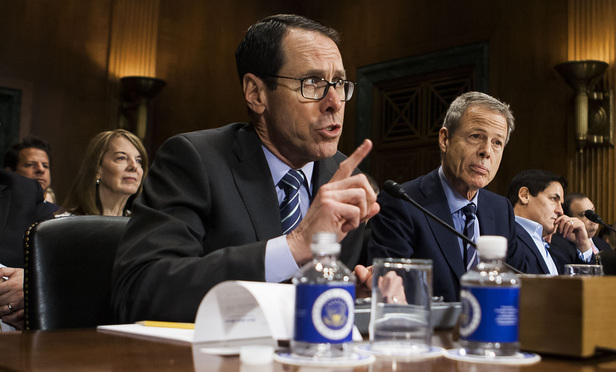Copyright the National Law Journal. All rights reserved. This material may not be published, broadcast, rewritten, or redistributed.
The chief executives of AT&T Inc. and Time Warner Inc. defended their proposed $85.4 billion merger in the face of skeptical U.S. lawmakers Wednesday, telling an antitrust panel that the deal would bring added competition to the media industry and widely benefit consumers.
“This is a classic vertical merger and eliminates no competitor from any market,” AT&T chief Randall Stephenson told the Senate Judiciary Committee. “Our intent is to disrupt the existing pay-TV model. We want to get the most content to the most people at the lowest prices.”
Time-Warner Inc. chief Jeff Bewkes said he was “confident that once everyone hears the facts and has the appropriate competition analysis, it will be seen and concluded by everyone that this will have pro-competitive effects.” He added: “We believe it, and we think we can prove it.”
Claims from the executives drew suspicion and, at times, pointed questions from Democrats who doubted AT&T’s insistence that the company would not withhold content or raise the cost of programming for its rivals after acquiring Time Warner.
Irrespective of the committee’s criticism of the deal, the antitrust review will ultimately fall in the hands of the U.S. Department of Justice—and possibly the Federal Communications Commission—under President-elect Donald Trump.
Slideshow: AT&T, Time Warner Execs Defend Merger
U.S. Sen. Richard Blumenthal, D-Connecticut, questioned whether the committee’s feedback on the deal is meaningless based on Trump’s promise on the campaign trail to block the AT&T-Time Warner deal. Trump said the deal is “too much concentration of power” in a limited sphere.
“Donald Trump has said he’s going to block this merger. And I take him at his word,” Blumenthal said, drawing laughter inside the hearing room.
In some of the most pointed questioning, U.S. Sen. Al Franken, D-Minnesota, asked whether the combination of AT&T and Time Warner would give the new company greater leverage to squeeze rival distributors in negotiations over program carriage. Both executives resisted the notion that they would shut out rivals, saying Time Warner was built on widely distributing its content. “We are of little value if we start limiting access to content,” Stephenson said.
Stephenson and Bewkes were joined by Mark Cuban, the billionaire investor and owner of the Dallas Mavericks basketball team who regularly appears on the ABC show “Shark Tank.”
Cuban testified in support of the proposed deal, saying it would better position an enlarged AT&T to compete with Apple, Google, Microsoft, Amazon and Facebook in a rapidly changing media landscape.
“By themselves, AT&T and Time Warner will have a very difficult time controlling their own destinies,” Cuban said.
The AT&T-Time Warner deal has drawn comparisons to Comcast’s acquisition of NBC Universal, a deal cleared by the Justice Department and FCC in 2011 with conditions to preserve competition.
U.S. Sen. Mike Lee, R-Utah, who’s on Trump’s list of 21 possible Supreme Court picks, noted that Comcast fought a condition that required it to juxtapose Bloomberg TV with Comcast’s own news networks on the channel lineup. Lee described the court fight, which Comcast eventually dropped, as “expensive, time-consuming litigation” and questioned whether the combined AT&T-Time Warner would adhere to any conditions that regulators may place on the deal, if they clear it at all.
“I think you would find that our track record in adhering to those has been very strong,” Stephenson said. The Justice Department, he added, has “no lack of resources” in pursuing violations of merger conditions.
Testifying against the deal, Gene Kimmelman, president and CEO of tech consumer advocate Public Knowledge, said conditions on mergers have proven difficult to enforce. Kimmelman pressed for a close review of the AT&T-Time Warner deal, saying that it’s “the diversity of programming owned by different people over different platforms that fuels our democracy.”
This content has been archived. It is available through our partners, LexisNexis® and Bloomberg Law.
To view this content, please continue to their sites.
Not a Lexis Subscriber?
Subscribe Now
Not a Bloomberg Law Subscriber?
Subscribe Now
LexisNexis® and Bloomberg Law are third party online distributors of the broad collection of current and archived versions of ALM's legal news publications. LexisNexis® and Bloomberg Law customers are able to access and use ALM's content, including content from the National Law Journal, The American Lawyer, Legaltech News, The New York Law Journal, and Corporate Counsel, as well as other sources of legal information.
For questions call 1-877-256-2472 or contact us at [email protected]





